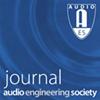无实体音色:语义提示调频合成的研究
IF 1.6
4区 工程技术
Q3 ACOUSTICS
引用次数: 2
摘要
无实体的电子声音构成了现代听觉词汇的很大一部分,但对音色感知的研究主要集中在传统声学乐器的音调上。目前尚不清楚这些研究的见解是否适用于电子声音,也不清楚这些研究与电子声音的产生有何关系。这项工作提出了一个关于FM合成产生的声音的语义关联的实验,目的是确定现有的音色语义模型是否适合这些声音。我们采用了一种新颖的实验模式,即经验丰富的声音设计师通过编写合成器来响应语义提示,并为他们创造的声音提供语义评级。探索性因子分析揭示了一个五维语义空间。前两个因素很好地映射到亮度、纹理和质量的概念。其余三个因素没有明确的相似之处,但与声学描述符的相关性分析表明,声学与亮度和纹理的关系。结果表明,进一步研究无实体电子声音的音色、合成及其语义关联是有价值的,这将有助于听觉感知和认知、合成控制和音频工程的研究。本文章由计算机程序翻译,如有差异,请以英文原文为准。
Disembodied Timbres: A Study on Semantically Prompted FM Synthesis
Disembodied electronic sounds constitute a large part of the modern auditory lexicon, but research into timbre perception has focused mostly on the tones of conventional acoustic musical instruments. It is unclear whether insights from these studies generalize to electronic sounds, nor is it obvious how these relate to the creation of such sounds. This work presents an experiment on the semantic associations of sounds produced by FM synthesis with the aim of identifying whether existing models of timbre semantics are appropriate for such sounds. A novel experimental paradigm, in which experienced sound designers responded to semantic prompts by programming a synthesizer, was applied, and semantic ratings on the sounds they created were provided. Exploratory factor analysis revealed a five-dimensional semantic space. The first two factors mapped well to the concepts of luminance, texture, and mass. The remaining three factors did not have clear parallels, but correlation analysis with acoustic descriptors suggested an acoustical relationship to luminance and texture. The results suggest that further inquiry into the timbres of disembodied electronic sounds, their synthesis, and their semantic associations would be worthwhile and that this could benefit research into auditory perception and cognition and synthesis control and audio engineering.
求助全文
通过发布文献求助,成功后即可免费获取论文全文。
去求助
来源期刊

Journal of the Audio Engineering Society
工程技术-工程:综合
CiteScore
3.50
自引率
14.30%
发文量
53
审稿时长
1 months
期刊介绍:
The Journal of the Audio Engineering Society — the official publication of the AES — is the only peer-reviewed journal devoted exclusively to audio technology. Published 10 times each year, it is available to all AES members and subscribers.
The Journal contains state-of-the-art technical papers and engineering reports; feature articles covering timely topics; pre and post reports of AES conventions and other society activities; news from AES sections around the world; Standards and Education Committee work; membership news, patents, new products, and newsworthy developments in the field of audio.
 求助内容:
求助内容: 应助结果提醒方式:
应助结果提醒方式:


